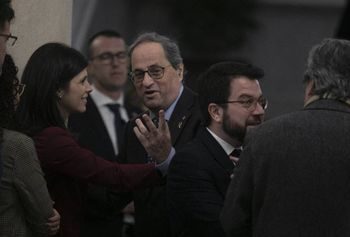

Spain’s High Court, the Audiencia Nacional, has opened an investigation into the alleged activities of a group linked with the Russian intelligence service during the 2017 Catalan breakaway bid, three sources have confirmed to EL PAÍS. The sealed investigation, opened by Judge Manuel García-Castellón, has been assigned to the General Information Office of the National Police, which specializes in counter-terrorism. The case centers on an elite military group called Unit 29155, which intelligence services from several countries have linked to alleged attempts to destabilize Europe.
This is not the first time that Russian spies have been suspected of influencing the Catalan independence movement
The High Court is investigating an alleged intervention of Unit 29155 that is related to the separatist drive in Catalonia, a legal source and two police sources have confirmed to EL PAÍS. These sources have defined the investigations as “confidential,” and the judge has kept the preliminary proceedings under seal. García Castellón is the judge who is currently overseeing the sweeping probe into separatist activity in Catalonia, which involves several different cases.
One case involves nine members of the Committees to Defend the Republic (CDR), a grassroots independence group that has been accused of creating an offshoot known as the Technical Response Team (ERT) and planning acts of violence in the lead up to the second anniversary of the unauthorized referendum on Catalan independence, and ahead of the Supreme Court’s ruling in October on the fate of Catalan separatist leaders who were tried earlier this year in connection with the unilateral secession attempt of 2017. The members were arrested in a raid dubbed “Operation Judas,” which also seized large amounts of explosive materials.
The probe also includes the terrorism investigation against Democratic Tsunami, one of the movements that has been most active in calling protests in Catalonia after the Supreme Court announced its ruling on the 12 separatist leaders on October 14. The sources declined to confirm whether the investigation into the activity of Unit 29155 agents is included in the same court probe. They insisted that the investigation is centered on the group’s possible destabilization efforts in Catalonia.
The existence of the elite Russian military group had been discussed in Russia’s independent media, but it only caught the world’s attention last October when The New York Times linked the group with its military name and published an in-depth investigation into the alleged implication of its agents in several incidents that have had a global impact.
Russia is trying to use secret operations to influence public opinion through extremist and racist organizations
Hans-Georg Maassen, former head of Germany’s intelligence service
Members of Unit 29155, for instance, have been implicated in the poisoning of former Russian spy Sergei Skripal and his daughter Yulia in the United Kingdom in March, 2018. Months later, the British government formally accused two officers for Russia’s Main Intelligence Directorate – known by its Russian acronym GRU – identified as Alexander Petrov and Ruslan Boshirov (false names) of being behind the attack that left Skripal and his daughter seriously ill after they came into contact with a Novichok nerve agent known as A-234, according to UK sources.
The unit has also been linked to the failed coup attempt in Montenegro, in southeast Europe, in October 2016. Two Russian nationals believed to be former spies, Eduard Shishmakov and Vladimir Popov, were convicted by the High Court in Podgorica of attempted terrorism and sentenced to long prison terms for their role in the plot. Several western intelligence services have also linked Unit 29155 to the two failed attempts to assassinate a Bulgarian arms dealer in 2015, and with a destabilization campaign in Moldova in eastern Europe. The Kremlin has consistently denied all connection to these events, and media outlets associated with the Russian government have ridiculed news published on the elite group.
Agent Fedotov
This is not the first time that Russia and its spies have been suspected of influencing the Catalan independence movement. In February, the investigative website Bellingcat published several official documents from the Russian secret service that placed a GRU official named Denis Sergeev in Barcelona on two occasions. Both times, he had traveled under the false name Sergey Fedotov.
On the first trip, Fedotov arrived in the Catalan capital on November 5, 2016, and after spending six days in Spain, returned to Moscow via Zurich. The second trip took place almost a year later on September 29, 2017, just two days before the illegal independence referendum on October 1. On that occasion, the Russian official stayed in Spain until October 9, when he returned to Moscow via Geneva. There is no evidence he made more visits to Spain, although he did travel to the United Kingdom exactly two days before the Skripal poisoning.
The unit has been linked to the failed coup attempt in Montenegro and the poisoning of former Russian spy Sergei Skripal
Last May, Germany’s secret services said they were “concerned” about Russian support for the Catalan independence movement after receiving information from European colleagues. Hans-Georg Maassen, the then-head of Germany’s intelligence service, the BfV, told a security summit in Berlin that it was “very plausible” that Moscow had carried out a disinformation campaign before the October 1 illegal referendum. “Russia is trying to use secret operations to influence public opinion through extremist and racist organizations,” he said. “In the case of the Catalan separatists, according to what’s been reported, supporting their position through propaganda activities.”
In Spain, the Civil Guard has found links between Russia and one of the Catalan separatists implicated in the secession drive: Víctor Terradellas, the former minister of international relations from the now-dissolved political party the Democratic Convergence of Catalonia (CDC), and a very close associate of ousted Catalan premier Carles Puigemont. Terradellas is under investigation for diverting subsidies from the Catalan regional government and Barcelona province. Terradellas advised Puigdemont on international relations, pressured him to declare independence in Catalonia and also sent Puigdemont numerous WhatsApp messages.
In one chat on October 26 – the day when the former premier had to decide whether to call new regional elections or declare independence – Terradellas suggested that Puigdemont should meet with him. He also told the former premier that an emissary of Russian President Vladimir Putin had confirmed that Russia would support a declaration of Catalan independence. When Puigdemont did not reply to the message, Terradellas sent another saying: “You haven’t even listened to us. I think we deserved it.” Puigdemont later said that declaring independence “could be devastating” for Catalonia, to which Terradellas replied that the emissary had “guaranteed” that former Russian leader Mikhail Gorbachev would back the declaration.
English version by Melissa Kitson.
Get real time update about this post categories directly on your device, subscribe now.





















